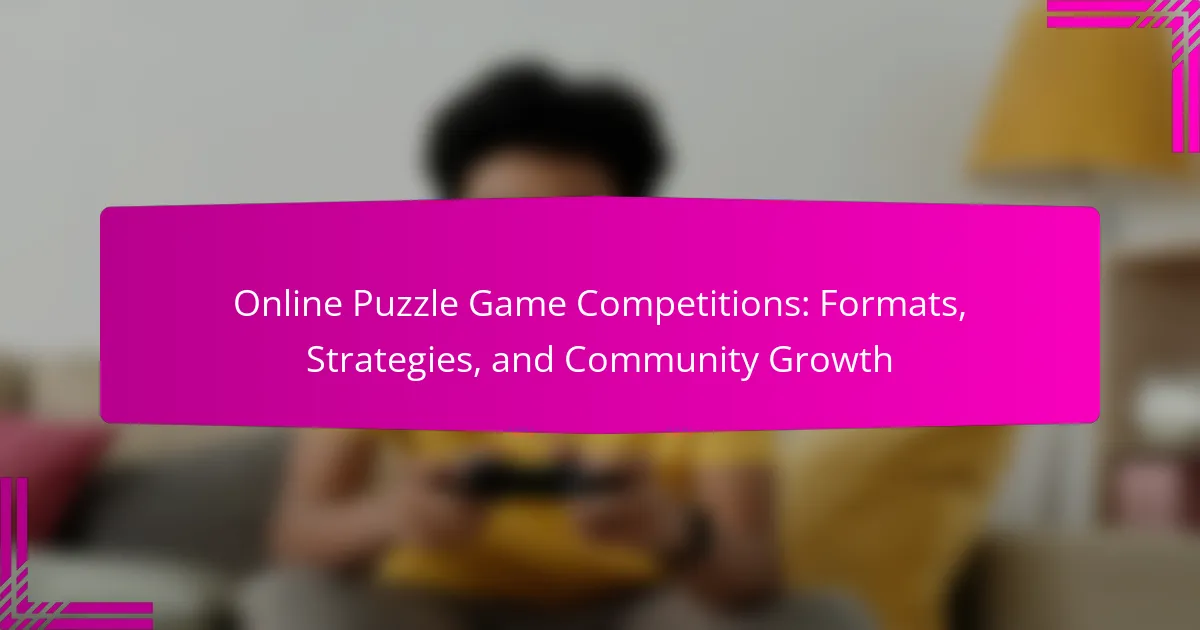Online puzzle game competitions offer engaging formats that challenge players and foster community growth. Explore the various competition styles, including timed challenges and knockout tournaments. Learn effective strategies for excelling in these events and discover how community engagement enhances the overall experience. Understand the unique aspects that differentiate competitions and the challenges organizers face in maintaining fairness.
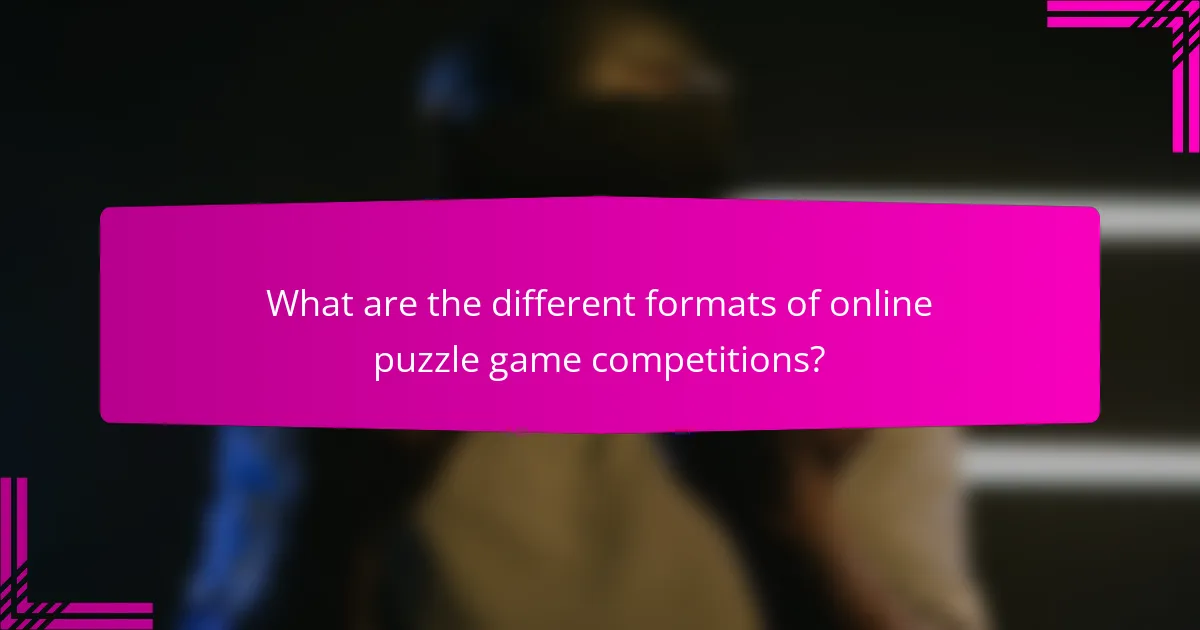
What are the different formats of online puzzle game competitions?
Online puzzle game competitions can take various formats, including timed challenges, knockout tournaments, and collaborative events. Each format offers unique engagement opportunities for players.
Timed challenges require participants to solve puzzles within a set timeframe, emphasizing speed and accuracy. Knockout tournaments eliminate players after each round, creating a competitive atmosphere. Collaborative events encourage teamwork, allowing players to solve puzzles together, fostering community interaction.
These formats contribute to the growth of the online puzzle gaming community by promoting diverse strategies and enhancing player engagement.
How do tournament structures influence player engagement?
Tournament structures significantly enhance player engagement by creating a sense of competition and community. Different formats, such as knockout or round-robin, influence how players interact and strategize. For example, knockout formats may heighten urgency and excitement, driving players to invest more time and effort. Conversely, round-robin formats foster ongoing participation and connection among players, encouraging social interactions. Engaging tournament structures can lead to increased player retention and a thriving community around online puzzle games.
Which platforms host the most popular puzzle competitions?
The most popular platforms hosting online puzzle competitions include Chess.com, Lichess, and PuzzleNation. These platforms provide diverse formats, from timed challenges to collaborative puzzles, fostering community engagement. Chess.com hosts tournaments with thousands of participants, while Lichess offers unique features like puzzle races. PuzzleNation specializes in crossword competitions, attracting dedicated enthusiasts.
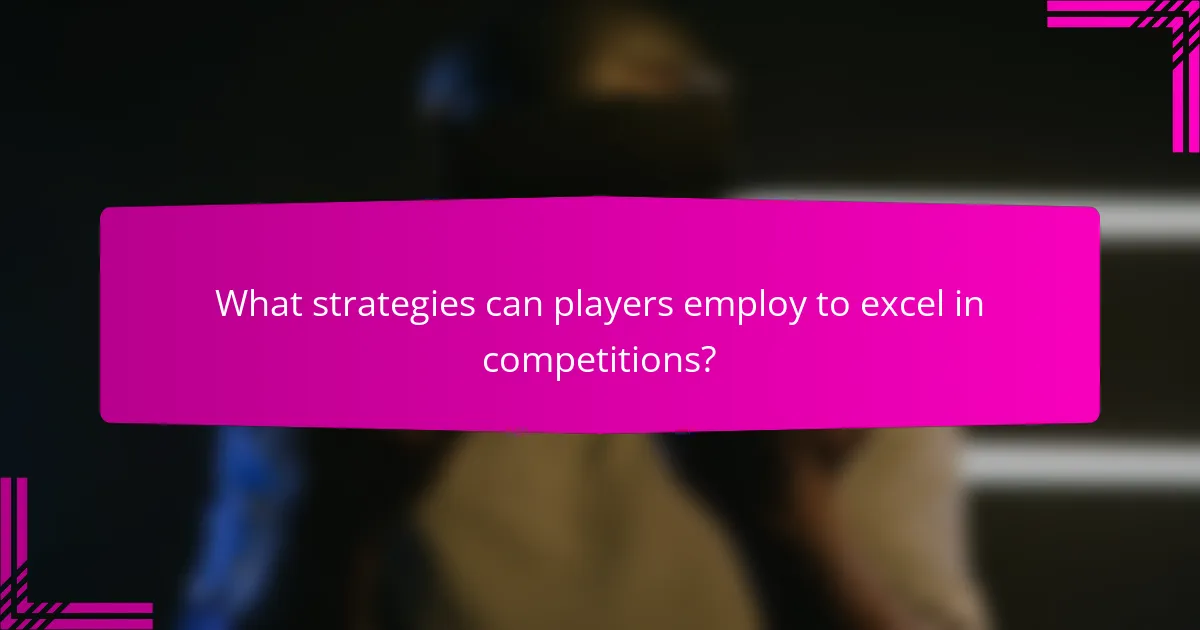
What strategies can players employ to excel in competitions?
Players can excel in online puzzle game competitions by employing strategic planning, practice, and community engagement. Focus on mastering game mechanics and patterns to enhance problem-solving skills. Regular practice helps improve speed and accuracy, essential for competitive play. Engaging with the community fosters knowledge sharing and access to new strategies. Analyzing opponents’ gameplay can provide insights into effective tactics. Lastly, participating in forums or social media groups can offer support and motivation.
How does practice frequency affect performance in puzzle games?
Practice frequency significantly enhances performance in puzzle games. Regular engagement builds familiarity with game mechanics and improves problem-solving skills. Players who practice consistently develop quicker recognition of patterns and strategies, leading to faster completion times and higher scores. Research indicates that dedicated practice sessions of at least 30 minutes several times a week yield noticeable improvements in gameplay. Additionally, community discussions often highlight that players who participate in competitions benefit from the practice frequency, as it fosters a competitive spirit and encourages skill development through peer interaction.
What role do problem-solving techniques play in competitive success?
Problem-solving techniques are crucial for achieving competitive success in online puzzle game competitions. They enhance strategic thinking and adaptability, allowing players to navigate challenges effectively. Mastery of these techniques can lead to improved performance and higher rankings within the community. Players who utilize diverse problem-solving strategies often foster a collaborative environment, contributing to community growth and knowledge sharing. This synergy not only elevates individual gameplay but also strengthens the competitive landscape overall.
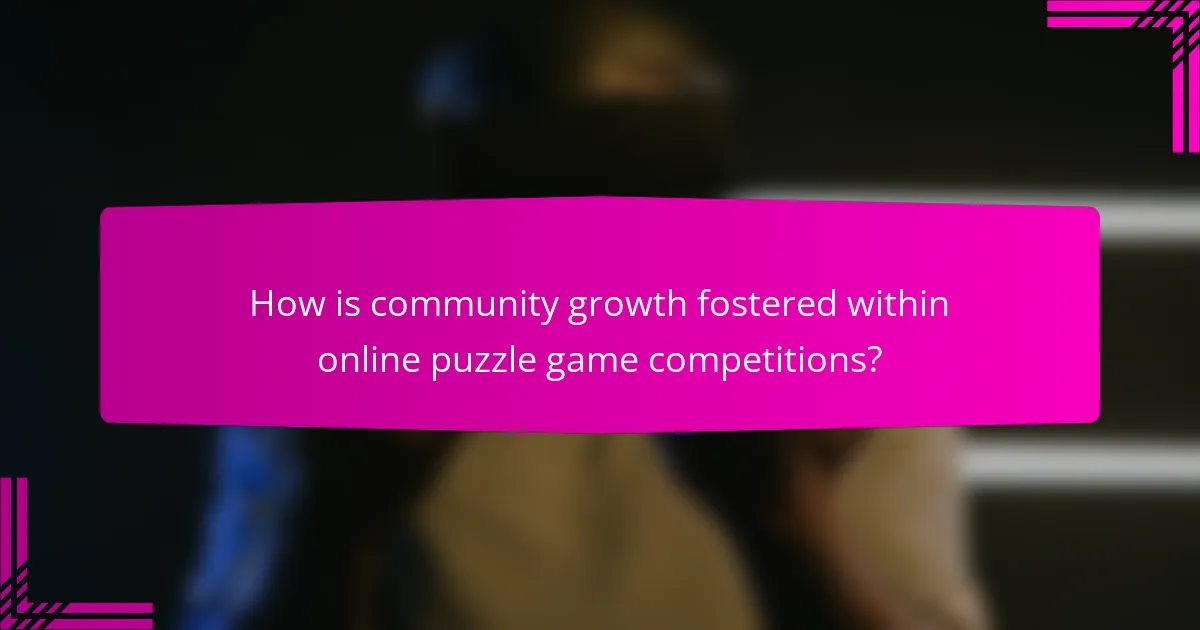
How is community growth fostered within online puzzle game competitions?
Community growth within online puzzle game competitions is fostered through collaboration, engagement, and shared experiences. Players often form teams or guilds, enhancing social interaction and mutual support. Competitions encourage regular participation, creating a sense of belonging. Events such as tournaments or challenges promote healthy competition, attracting new players and retaining existing ones. Additionally, platforms that facilitate communication, such as forums and social media, help build community ties and share strategies. These elements collectively contribute to a vibrant and growing community around online puzzle games.
What are the key factors driving player retention in puzzle gaming communities?
Engaging gameplay, community interaction, and regular updates are key factors driving player retention in puzzle gaming communities. Players are more likely to stay when competitions offer diverse formats and challenges that stimulate interest. Strong social connections fostered through forums and events enhance loyalty. Frequent updates and new content keep the gaming experience fresh, encouraging ongoing participation.
How do social features enhance community interaction and competition?
Social features significantly enhance community interaction and competition by fostering engagement and collaboration among players. These features include leaderboards, chat systems, and team challenges, promoting a sense of belonging and motivation. Leaderboards create a competitive atmosphere, encouraging players to improve their skills. Chat systems facilitate communication, allowing players to share strategies and form friendships. Team challenges strengthen community bonds, as players work together towards common goals. Overall, these elements contribute to a vibrant community that thrives on interaction and competition.
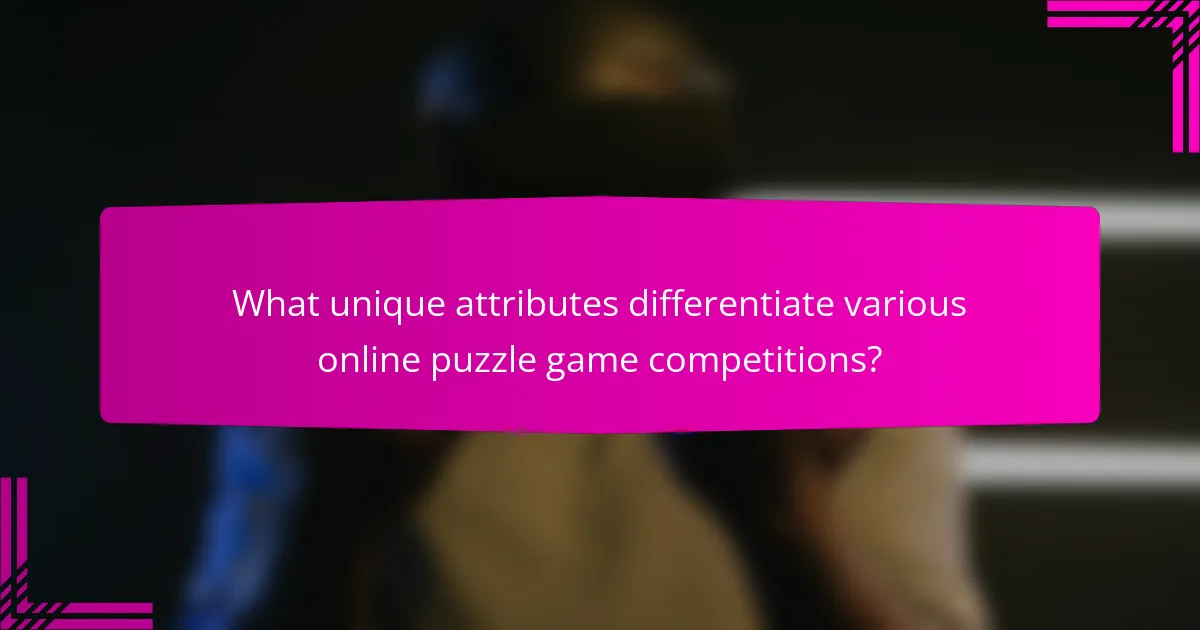
What unique attributes differentiate various online puzzle game competitions?
Unique attributes that differentiate various online puzzle game competitions include game formats, scoring systems, and player engagement strategies. These competitions often feature timed versus untimed formats, which can influence player performance and strategy. Scoring systems may vary, with some competitions using cumulative scores while others implement elimination rounds. Community engagement tactics, such as leaderboards and social media integration, also distinguish these competitions by fostering interaction among players.
How do prize structures vary across different competitions?
Prize structures in online puzzle game competitions can vary significantly based on the competition format and organizer. Common structures include cash prizes, in-game rewards, and leaderboard rankings.
For example, some competitions offer tiered cash prizes based on participants’ performance, while others might provide exclusive in-game items or tokens. Community-driven events may feature prizes determined by player votes or participation levels.
Additionally, the prize pool can fluctuate based on entry fees or sponsorship contributions, influencing the overall rewards available. This diversity in prize structures enhances community engagement and motivates players to improve their skills.
What are the cultural influences on game design and competition formats?
Cultural influences significantly shape online puzzle game competitions, affecting their formats and community engagement. Regional preferences dictate game themes, design aesthetics, and competition rules. For instance, Asian markets often favour mobile accessibility, while Western audiences may prioritise multiplayer formats.
Cultural narratives also inform puzzle complexity and gameplay mechanics. In some cultures, collaborative play is encouraged, leading to team-based competitions. Conversely, individual achievements are celebrated in others, promoting solo challenges.
Community growth is further driven by cultural events and festivals, which often feature puzzle competitions, fostering local engagement. These events create opportunities for players to connect, share strategies, and celebrate their cultural identities through gaming.
In summary, cultural influences on game design and competition formats manifest through regional preferences, gameplay mechanics, and community-building events.
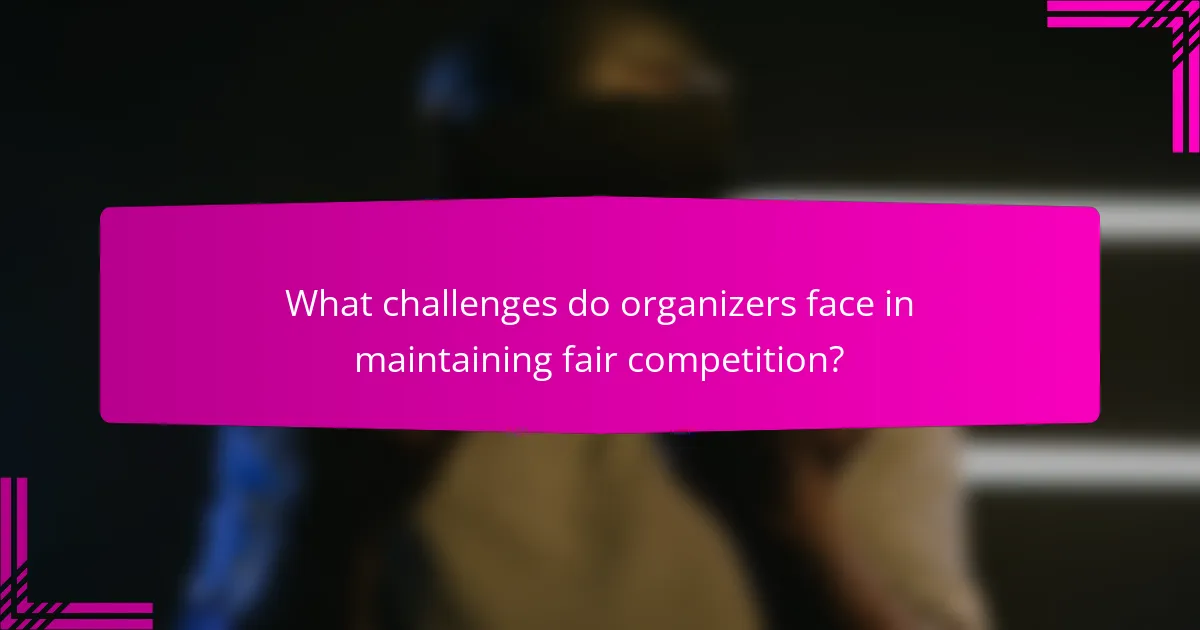
What challenges do organizers face in maintaining fair competition?
Organizers face several challenges in maintaining fair competition in online puzzle game events. Key issues include ensuring equal access to resources, managing participant behavior, and addressing technical discrepancies.
Equal access is crucial; disparities in skill levels or resources can skew results. Organizers must implement standardized rules and guidelines to mitigate this. Managing participant behavior is another challenge, as unsportsmanlike conduct can disrupt the integrity of competitions. Clear codes of conduct and monitoring systems can help maintain fairness.
Technical discrepancies, such as varying internet speeds or device capabilities, can affect performance. Organizers often need to establish minimum requirements and provide support to ensure a level playing field. Overall, addressing these challenges is essential for fostering a competitive yet fair environment in online puzzle game competitions.
How do cheating prevention measures impact player experience?
Cheating prevention measures enhance player experience by fostering fair competition. These measures build trust within the community and encourage participation. Players feel more engaged when they know the competition is equitable. For example, implementing robust verification systems can reduce instances of cheating, leading to a more enjoyable gaming environment. As a result, community growth is supported, as players are more likely to recommend a fair platform to others.
What are the implications of varying skill levels among participants?
Varying skill levels among participants can enhance competition dynamics and community engagement. Beginners may experience growth through interaction with skilled players, while experts can refine their strategies. This diversity fosters a richer gaming environment, encouraging collaboration and learning. Additionally, competitions can be structured to accommodate different skill levels, promoting inclusivity and sustained interest in online puzzle games.
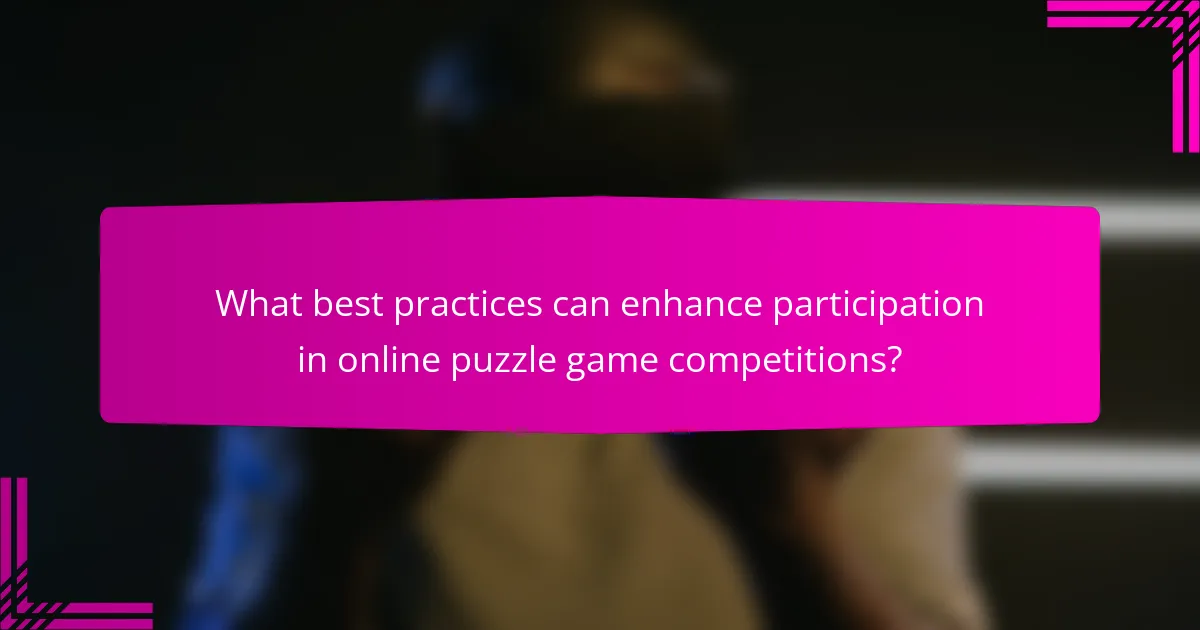
What best practices can enhance participation in online puzzle game competitions?
Engaging participants in online puzzle game competitions requires strategic approaches. Focus on creating a welcoming community, offering diverse game formats, and providing incentives for participation.
Encourage social interaction through forums and chat features to build camaraderie. Utilize various competition formats, such as timed challenges or team-based events, to cater to different player preferences. Provide rewards, like in-game items or recognition, to motivate players.
Regularly update games with new puzzles and challenges to maintain interest. Promote competitions through social media and gaming platforms to reach a wider audience. Foster a culture of inclusivity to attract diverse participants.
How can players effectively prepare for upcoming competitions?
Players can prepare effectively for online puzzle game competitions by practicing regularly, studying strategies, and engaging with the community. Consistent practice enhances skills and familiarity with game mechanics. Analyzing successful strategies from top players can provide valuable insights. Participating in community forums fosters collaboration and knowledge sharing, creating a supportive environment for improvement. Additionally, setting specific goals and tracking progress can help maintain motivation and focus.
What common mistakes should competitors avoid to improve their chances of success?
Competitors should avoid common mistakes like neglecting community engagement, underestimating marketing efforts, and failing to analyze competitors. These factors significantly impact success in online puzzle game competitions.
Ignoring player feedback can lead to missed opportunities for improvement. Additionally, not diversifying game formats may limit audience reach. Overlooking the importance of a strong online presence can hinder growth in community participation. Lastly, underestimating the role of strategic partnerships can reduce visibility and collaborative opportunities.
